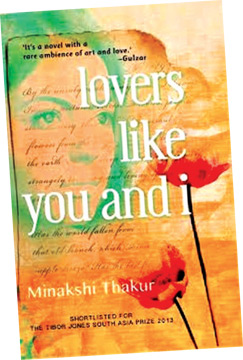|
Minkathis Thakur’s ‘Lovers like You and I’:
Loves and losses of soulful voices
by Dilshan Boange
Is love all conquering or does it leave the love stricken broken and
defeated if love fails to bloom to what it is thought as it ideally
ought to, as dreamt in the hearts of lovers true?
 What clasps love in the folds of time and chronology and what makes a
certain loves timeless? Is there really a ‘together forever’ that
actually applies for the love that never dies in the heart of the lover
who creates a personal history of his or her truly lived love, made into
a privately archived narrative of letters and lovers’ souvenirs? What clasps love in the folds of time and chronology and what makes a
certain loves timeless? Is there really a ‘together forever’ that
actually applies for the love that never dies in the heart of the lover
who creates a personal history of his or her truly lived love, made into
a privately archived narrative of letters and lovers’ souvenirs?
These can be questions subtly raised in the mind of the reader from
the stories that are built around the central protagonist Nayan and the
lives and loves and the losses that unfold in Indian novelist Minakshi
Thakur’s debut novel ‘Lovers like you and I’.
This is not a sweeping dreamy romance saga that builds on the pop
culture romance-lit elements and storyline.
Highs and lows that rollercoaster to pump pulses of the giddy and
feverish romance seeker aren’t to be found in the pages of ‘Lovers like
you and I’.
The author Minakshi Thakur’s approach to love, in this novel does not
deny the sombre and downcast sense of inner solitudes and silences
caused by love which sometimes may seem as insurmountable and very much
the painful inheritance of certain kinds of lovers.
One of the most striking lines that bespoke the essence of the
approach and philosophy in this novel about understanding love as seen
in this modern age is found in the love letter written in orange juice
by Nayan dated 5th was wrong.
Free verse itself was never free.” The line reads out from Nayan’s
letter to her lover Salil who never fully appreciates the depth of the
love she has for him, and much of that love being built on her virtue of
patience to allow him to be who he is despite the fact that such
undemanding ways as hers only keeps doors open for him to be the
wandering soul that will not commit a lifetime for the woman who loves
him more than he ever fully understands.
Invisible ink
During the span of the novel, until the very last, when the love
letters written in the invisible ink of orange juice become ‘deciphered’
to him as readable material is when Salil sees that part of Nayan’s love
for him to which he was partly blind.
It is only the warmth of a simple candle flame that is needed as the
story tells us.
But even the simplest source of warmth and light may be too distant
when the heart is closed off to the possibilities of bonds that bind,
which seems the case with Salil from my reading of the symbolism of the
novel in conjunction with the character and the actions that drive his
role in the story.
But then does Salil finally commit a life time to Nayan? That is left
open as a puzzle to be concluded by the reader which can best be pieced
together from the subjective character analysis each reader is entitled
to do. Passing judgements on what counts as the estimable and what is
the condemnable in the narratives of lovers isn’t the ways in which
Thakur has delivered her picture and destination as to what and who
finally counts as ‘acceptable’.
October 1999. “Whoever thought love is a free verse There is a dire
sense of realism that is undeniable, built in the deeper meanings the
authoress delivers to her readers in this novel.
And that realism is the understanding that the emotional state of
love and the actions and ways of lovers cannot be read as easily as
legible letters that profess love.
 Legibility has little to do with understanding the heart of a lover. Legibility has little to do with understanding the heart of a lover.
‘Lovers like you and I’ is a conveyor of that often unrealised truth.
Inseparable melding
What place does love have in the scenario of marriage and should
there always be an integral, inseparable melding of two people in
attractions of both body and mind where marriage is concerned? Is
marriage merely a close companionship where two people enjoy each
other’s undivided company and may seek physical conjugal union with the
other if and when there is an inclination towards such behaviour?
This is one of the stringent questions that Thakur brings out through
the relationship between Nayan and Jeeban and where they head towards
when they each find in the other a ‘solution’ to the crippling isolation
and loneliness they both feel in the wake of tragic incidents that leave
them both emotionally debilitated in many ways.
There can, however, never really be a love of romance between two
people where the relationship is completely absent of a mutually felt
and shared element of physical desire.
The chapter ‘Us together by the river’ is one that loosens those
problematic knots to a great extent where the path to contemplation and
honesty to one’s own feelings about the other allows silent and peaceful
resolution.
In the film ‘Notes on a scandal’ the voice of Judi Dench says, “We
are bound by the secrets we share”. Sometimes, perhaps the deepest
secrets shared between friends who attempted discreetly to be lovers for
reasons that were not fully clear to them and impelled through factors
that do not form the base of a solid love relationship to begin with,
are the decisions they arrived at undeclared to the world, and unspoken
even between themselves in the end; for the bond they share is of a
depth that even the retraction from a decision needs no explanation in
words to the other.
There is in bonds a certain kind of love where a deep seated caring
forms a platonic love that cannot be undermined. One must note that
Thakur has perceived the importance of the love shared by companions
such as Nayan and Jeeban in her discourse through fiction to explicate
the human phenomenon of love for its manifold complexities.
Placid
The final chapter titled ‘Now I understand’ felt very much the end of
a journey where Salil the free spirited one has felt the weariness upon
his wings and was caused to find a place of rest, which is assured in
the comfort of his parental home.
The reader finds the character of Salil placid in a way as if he has
been placated of his need for an impulsiveness defiant to any form of
establishment as his definitive attribute, and in a more amenable state
to the ways of family, relationships, and the bonds and duties that
arise consequently.
The matured Salil in this respect of not mere willingness to commit,
but of a self driven desire to commit to a relationship, is the one whom
Nayan waited all the while. In this sense what may finally unfold
between those two lovers leaves one to feel that love is partly about
the agonisingly sweet wait for destiny to unfold, at some point in time.
But the strength to wait may not surely be an attribute everyone would
possess.
As a Sri Lankan I found this novel of a distinct Indian cultural
setting translating itself rather well despite the texture of a Hindi
mixed English narrative.
A salutary feature in the narrative that evinces the authoress had a
readership in mind outside the boundary of Hindi-English bilinguals is
where the Hindi verses are presented in their English translated meaning
in parenthesis.
Arundathi Roy’s ‘The God of Small Things’ has this narrative approach
which serves the effect of presenting a scripted form of the vernacular
that is sought to be impressed on the reader for the poetic tonality
that may be read off the pages to evoke the musicality involved.
In that particular point of the narrative to enhance the moment it
depicts and seeks to create in the mind of the reader, while at the same
time including its literal meaning in parenthesis to denote the
translation to be understood as an element symbolically ‘outside the
narrated timeline of actions’ or ‘moment’ and meant to function as a
fixture that offers a fuller understanding of what the moment is in
connection with the vernacular element represented textually.
Prose narrative
The texture of the novel shows a richness not only for the verse it
has woven to the prose narrative but also for the variance in prose
devices devised to narrate the story. Diary entries and letters form a
significant part of the mode of the story narrative and add to the
diversification of narrative voice and perspective. Another aspect of
the book that may be considered as part of the texture of the story’s
presentation is the pencil line sketched illustrations that accompany
each chapter.
On this aspect of the book my reading experience is significantly
affected as per giving direction to the reader’s mind on the schema of
images to be created by the words of the narrative.
The pictures posit the tone and layer of the story as one that arises
from a somewhat younger, modern generation of storytelling.
Through the cultural landscapes the author offers the reader, both
through characters such as ‘the bride form Nepal’ and the scenarios they
are found in and the different rituals and ceremonies that connect with
their lives, interesting insights of geo-social aspects, showing
diversities that create cultural richness is delivered. Living in the
densely populated Calcutta and the unbridgeable divides between urban
and rural locales creates vivid imagery that creates a mosaic of
topography as the story takes the reader to various parts of the
subcontinent.
‘Lovers like you and I’ is a story off the beaten track, charting its
own path and individual voice. It may not drive you to turn page after
page unceasingly but call your senses to pause and contemplate at
certain junctures to reflect and wonder how much of the moods and
moments crafted in words connect with you and your own world of
experience.
The book will read itself out to you, in song, in verse, in snippets
of poetry written on the back of receipts from coffee houses in Delhi,
presenting a pulse from a new age of writing, exploring and explicating
the beauties and intricacies of love. |

